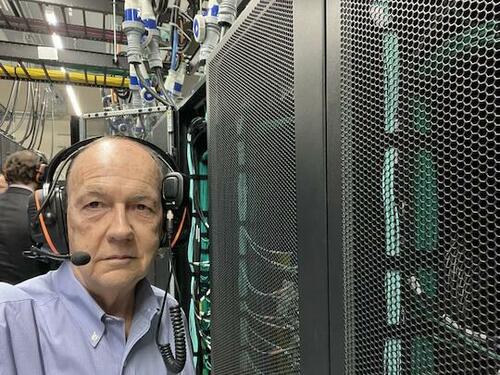
Authored by James Rickards via Daily Reckoning,
As you know, artificial intelligence (AI) is all the rage these days. From a market perspective, it’s certainly taken on bubble dynamics.
And I believe leading AI chipmaker Nvidia is about to get hammered, which could trigger a much broader market crash beginning tomorrow afternoon, shortly after 4 p.m.
But from a broader AI perspective, the news is full of stories about how machines with vast computing power and blinding processing speeds, given access to billions of books and documents and the ability to teach themselves, are poised to take over the world.
Is it true? I’ve been studying AI and its potential for years, so I have a deeper understanding of AI than the average talking head.
I’ve actually spent time visiting with the world’s third-fastest non-government supercomputer (the HiPerGator AI computer at the University of Florida) as part of a project to apply generalized superintelligence and AI to national security tasks.
So how advanced is AI getting? How close is it to approaching a rough parity with human intelligence? And what dangers does it pose to humanity?
We Can Just Pull the Plug — for Now at Least
Experimenters now envision machines taking on a life of their own and attacking humans and civilization. But it’s important to remember that if the machine goes berserk, you can just pull the plug.
Apologists for AI capacity claim that pulling the plug won’t work because the AI will anticipate that strategy and “export” itself to another machine in a catch-me-if-you-can scenario where disabling one location won’t stop the code and algorithms from popping up elsewhere and continuing to attack.
Maybe. But there are all kinds of logistical problems with this, including the availability of enough machines with the processing power needed, the fact that alternate machines are likely to be surrounded by firewalls and digital moats and a host of configuration and interoperability issues.
So for now, you can just pull the plug. In fact, there are a number of safeguards being proposed to limit the potential damage of AI while still harnessing its enormous benefits.
This isn’t a technical article, but these safeguards include transparency (so that third parties can identify flaws), oversight, a weakened form of adversarial training (so the machine can solve problems without plotting against us in its spare time), approval-based modification (the machine has to “ask permission” before activating autonomous machine learning), recursive reward modeling (the machine only moves in certain directions where it gets a “pat on the head” from humans) and other similar tools.
Of course, none of these safeguards works if the power behind AI is malignant and actually wants to destroy mankind. This would be like putting atomic weapons in the hands of a desperate Adolf Hitler. We know what would have happened next.
James Bond With AI
The solution in that case would be more political, forensic and defense oriented. Intelligence gathering would play a huge role. Of course, that evolves quickly into a machine-versus-machine intelligence war of collection and deception.
Imagine James Bond with a hyper-computer instead of a Walther PPK. AI’s more immediate threat is less serious, but nonetheless disturbing, especially for investors.
Investors need to be careful about relying on GPT systems for financial advice, despite their enormous processing power. The output is never better than the inputs and the market inputs are littered with bad models, false assumptions, poor forecasting records and biases.
Garbage in, garbage out.
AI is already being programmed with woke ideology, for example. You probably recall Google’s ridiculous Gemini AI-backed image generator that depicted Black Vikings, female popes and other absurd images. You can imagine the dystopian future that a woke superintelligence could create.
A Woke 1984
You’re probably familiar with George Orwell’s classic dystopian novel Nineteen Eighty-Four; (it’s often published as 1984). It was written in 1948; the title comes from reversing the last two digits in 1948.
Orwell created an original vocabulary for his book, much of which is in common, if sardonic, usage today. Terms such as Thought Police, Big Brother, doublethink, Newspeak and memory hole all come from Nineteen Eighty-Four.
Orwell intended it as a warning about how certain countries might evolve in the aftermath of World War II and the beginning of the Cold War. He was certainly concerned about Stalinism, but his warnings applied to Western democracies also.
When the calendar year 1984 came and went, many breathed a sigh of relief that Orwell’s prophecy had not come true. But that sigh of relief was premature. Orwell’s nightmare society is here today in the form of Communist China.
1984 Comes to China
China has most of the apparatus of the totalitarian societies described in Orwell’s book. China is working hard on AI while using facial recognition software and ubiquitous digital surveillance to keep track of its citizens. The internet is censored and monitored. Real-life thought police will arrest you for expressing opinions opposed to the government or its policies.
While China’s worst excesses are not going to happen in the U.S. or what passes for the West these days, the less extreme aspects of China’s surveillance state could.
And while you might not be arrested for expressing unpopular opinions or challenging prevailing dogmas (at least not yet), you could face other sanctions. You could even lose your job and find it nearly impossible to find another. Think cancel culture.
But it’s not just China. Messaging app Telegram founder Pavel Durov was just arrested at an airport in France. It’s very possible the U.S. government had a role in the arrest, along with the EU.
The authorities claim Telegram was promoting child pornography and other heinous acts. But in reality, Durov was arrested because he was not accommodating to Western government requests that he censor certain information and viewpoints. Also, because he wouldn’t provide authorities with information about the producers of that content (Telegram offers producers encryption options).
That’s the real reason Durov was arrested. Is Elon Musk next?
“Show Me the Man and I’ll Show You the Crime”
Here in the U.S., many conservative social media participants have had their accounts closed or suspended, not for threats or vulgarity or promoting child pornography, but for criticism of “progressive” views (albeit criticism with some sharp edges).
Meanwhile, those with progressive views can say almost anything on social media, including the implicit endorsement of violence. But nothing happens.
The problem is the trend is moving very quickly in this direction and it’s difficult to stop. And sophisticated surveillance technology to monitor citizens is already in place…
For example, cameras with the latest surveillance technology can spot and match millions of faces in real-time with an accuracy rate of over 99%. They’re touted as anti-terrorism and anti-crime tools, which they certainly are.
But as Stalin’s ruthless secret police chief Lavrentiy Beria said, “Show me the man and I’ll show you the crime.” It’s easy to see that power being abused to target everyday citizens.
(By the way, Beria would ultimately prove his own point, as he was later arrested and executed for treason.)
Circling back to AI, the problem is once the bad actors start populating the literature with misleading information and developer biases infiltrate the code, it’s clear that AI can be an instrument of tyranny.
In all, AI is definitely something to keep an eye on, and we should be asking important questions. But we shouldn’t worry about it taking over the world anytime soon.
We should instead worry about becoming like Communist China.
Authored by James Rickards via Daily Reckoning,
As you know, artificial intelligence (AI) is all the rage these days. From a market perspective, it’s certainly taken on bubble dynamics.
And I believe leading AI chipmaker Nvidia is about to get hammered, which could trigger a much broader market crash beginning tomorrow afternoon, shortly after 4 p.m.
But from a broader AI perspective, the news is full of stories about how machines with vast computing power and blinding processing speeds, given access to billions of books and documents and the ability to teach themselves, are poised to take over the world.
Is it true? I’ve been studying AI and its potential for years, so I have a deeper understanding of AI than the average talking head.
I’ve actually spent time visiting with the world’s third-fastest non-government supercomputer (the HiPerGator AI computer at the University of Florida) as part of a project to apply generalized superintelligence and AI to national security tasks.
So how advanced is AI getting? How close is it to approaching a rough parity with human intelligence? And what dangers does it pose to humanity?
We Can Just Pull the Plug — for Now at Least
Experimenters now envision machines taking on a life of their own and attacking humans and civilization. But it’s important to remember that if the machine goes berserk, you can just pull the plug.
Apologists for AI capacity claim that pulling the plug won’t work because the AI will anticipate that strategy and “export” itself to another machine in a catch-me-if-you-can scenario where disabling one location won’t stop the code and algorithms from popping up elsewhere and continuing to attack.
Maybe. But there are all kinds of logistical problems with this, including the availability of enough machines with the processing power needed, the fact that alternate machines are likely to be surrounded by firewalls and digital moats and a host of configuration and interoperability issues.
So for now, you can just pull the plug. In fact, there are a number of safeguards being proposed to limit the potential damage of AI while still harnessing its enormous benefits.
This isn’t a technical article, but these safeguards include transparency (so that third parties can identify flaws), oversight, a weakened form of adversarial training (so the machine can solve problems without plotting against us in its spare time), approval-based modification (the machine has to “ask permission” before activating autonomous machine learning), recursive reward modeling (the machine only moves in certain directions where it gets a “pat on the head” from humans) and other similar tools.
Of course, none of these safeguards works if the power behind AI is malignant and actually wants to destroy mankind. This would be like putting atomic weapons in the hands of a desperate Adolf Hitler. We know what would have happened next.
James Bond With AI
The solution in that case would be more political, forensic and defense oriented. Intelligence gathering would play a huge role. Of course, that evolves quickly into a machine-versus-machine intelligence war of collection and deception.
Imagine James Bond with a hyper-computer instead of a Walther PPK. AI’s more immediate threat is less serious, but nonetheless disturbing, especially for investors.
Investors need to be careful about relying on GPT systems for financial advice, despite their enormous processing power. The output is never better than the inputs and the market inputs are littered with bad models, false assumptions, poor forecasting records and biases.
Garbage in, garbage out.
AI is already being programmed with woke ideology, for example. You probably recall Google’s ridiculous Gemini AI-backed image generator that depicted Black Vikings, female popes and other absurd images. You can imagine the dystopian future that a woke superintelligence could create.
A Woke 1984
You’re probably familiar with George Orwell’s classic dystopian novel Nineteen Eighty-Four; (it’s often published as 1984). It was written in 1948; the title comes from reversing the last two digits in 1948.
Orwell created an original vocabulary for his book, much of which is in common, if sardonic, usage today. Terms such as Thought Police, Big Brother, doublethink, Newspeak and memory hole all come from Nineteen Eighty-Four.
Orwell intended it as a warning about how certain countries might evolve in the aftermath of World War II and the beginning of the Cold War. He was certainly concerned about Stalinism, but his warnings applied to Western democracies also.
When the calendar year 1984 came and went, many breathed a sigh of relief that Orwell’s prophecy had not come true. But that sigh of relief was premature. Orwell’s nightmare society is here today in the form of Communist China.
1984 Comes to China
China has most of the apparatus of the totalitarian societies described in Orwell’s book. China is working hard on AI while using facial recognition software and ubiquitous digital surveillance to keep track of its citizens. The internet is censored and monitored. Real-life thought police will arrest you for expressing opinions opposed to the government or its policies.
While China’s worst excesses are not going to happen in the U.S. or what passes for the West these days, the less extreme aspects of China’s surveillance state could.
And while you might not be arrested for expressing unpopular opinions or challenging prevailing dogmas (at least not yet), you could face other sanctions. You could even lose your job and find it nearly impossible to find another. Think cancel culture.
But it’s not just China. Messaging app Telegram founder Pavel Durov was just arrested at an airport in France. It’s very possible the U.S. government had a role in the arrest, along with the EU.
The authorities claim Telegram was promoting child pornography and other heinous acts. But in reality, Durov was arrested because he was not accommodating to Western government requests that he censor certain information and viewpoints. Also, because he wouldn’t provide authorities with information about the producers of that content (Telegram offers producers encryption options).
That’s the real reason Durov was arrested. Is Elon Musk next?
“Show Me the Man and I’ll Show You the Crime”
Here in the U.S., many conservative social media participants have had their accounts closed or suspended, not for threats or vulgarity or promoting child pornography, but for criticism of “progressive” views (albeit criticism with some sharp edges).
Meanwhile, those with progressive views can say almost anything on social media, including the implicit endorsement of violence. But nothing happens.
The problem is the trend is moving very quickly in this direction and it’s difficult to stop. And sophisticated surveillance technology to monitor citizens is already in place…
For example, cameras with the latest surveillance technology can spot and match millions of faces in real-time with an accuracy rate of over 99%. They’re touted as anti-terrorism and anti-crime tools, which they certainly are.
But as Stalin’s ruthless secret police chief Lavrentiy Beria said, “Show me the man and I’ll show you the crime.” It’s easy to see that power being abused to target everyday citizens.
(By the way, Beria would ultimately prove his own point, as he was later arrested and executed for treason.)
Circling back to AI, the problem is once the bad actors start populating the literature with misleading information and developer biases infiltrate the code, it’s clear that AI can be an instrument of tyranny.
In all, AI is definitely something to keep an eye on, and we should be asking important questions. But we shouldn’t worry about it taking over the world anytime soon.
We should instead worry about becoming like Communist China.
Loading…





